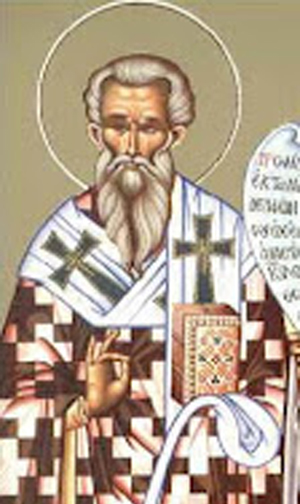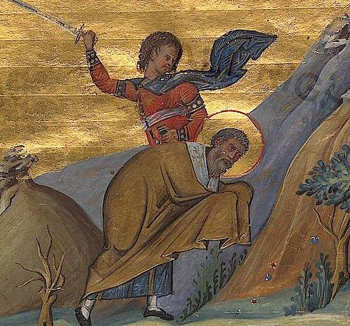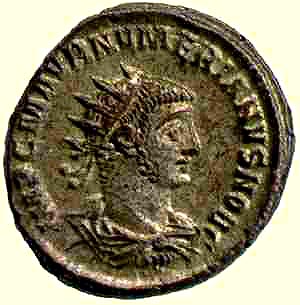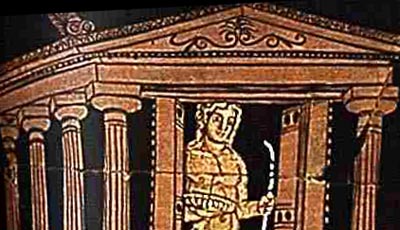 |
The Saint of the Day
St. Babylas, January 24
Prof. Plinio Corrêa de Oliveira
Biographical selection:

St Babylas, Bishop of Antioch
|
St. Babylas lived in the third century. He was Bishop of Antioch and much loved by the people. One day the pagan Emperor Numerian ordered that a young girl be sacrificed to the idols. She was the daughter of a king and had been taken as hostage in a war. After this crime, he went to enter the Cathedral of Antioch to mock the Catholics.
He was met at the door, however, by St. Babylas, who told him: “Step back, impure and sacrilegious man. You shall not enter here.” A great hatred for the Prelate filled Numerian.
Later, he arrested the Bishop with three of his disciples to submit them to interrogations at which he was present. During one of them he ridiculed the saint saying: “By the gods, I suppose that you must teach interesting things to the fools of whom you are the master, since you have a school.”
The Prelate replied: “Yes, I teach wisdom and truth to children. As for the fools, they do not attend my school; otherwise you would be there.”
After torturing the disciples of St. Babylas, the Emperor went to him, saying:
“Listen to me, o master who teaches such stupidities to children. This time you have lost, for your three students have just finished offering sacrifices to the gods.”
“You lie, shameless man. You do this naturally, since you are son of the Devil, the liar par excellence.”
The Emperor condemned him to die. As he was being led away, he exhorted the people saying:
“Around my neck is a collar of iron and chains. I solemnly exhort you in the name of God to bury them close to my body, for one day they will give testimony against this tyrant whom the eternal fire awaits.”

The martyrdom of St Babylas |
After his death St. Babylas was much venerated in the East and many churches were dedicated to him.
The man of God fixed his severe glance on him and responded:
In 363 Emperor Julian the Apostate visited Antioch to offer sacrifices to Apollo, whose temple he found abandoned. He asked an old pagan why this was so, and the man responded that Apollo no longer gave prophecies there because he was disturbed by the presence in that city of the remains of one man. It was St. Babylas.
Julian wanted to take the relics of the saint and send them away. But all the inhabitants of the city came in procession in defense of their former Bishop singing:
“Let them be all confounded that adore graven things, and that glory in their idols. Adore Him, all you His angels. People, bend thy knees before the most high Lord over all the earth. He is exalted exceedingly above all gods.”
Julian’s plan was frustrated, and the relics of St. Babylas remained in the city.
Comments of Prof. Plinio:
It is interesting to see that the physiognomy of this martyr is quite different from what is normally presented to us by a certain Romantic school of hagiography. This school pictures the martyr always forgiving those who are inflicting death on him.
his is legitimate, of course. It is very noble and beautiful that the martyr at the moment he is delivering his life to God, cuts himself off from the world around him, even his persecutors, and thinks exclusively of God. It is noble of him to forgive and pray for those who are against him. Our Lord Himself prayed for the good thief and forgave those who inflicted death on him.

The Emperor Numerian persecuted the Catholics in the East
|
But what is wrong in this school is to imply that if a saint died cursing his enemies and condemning the crimes of his adversaries, he would not be a true saint. He would not have practiced the virtue of forgiveness and the virtue of love of neighbor. So he would not deserve to go straight to Heaven.
One can see an implicit censure of the action of St. Babylas, who did this, in the fact that his life is not well known, and pictures or statues of him are not disseminated.
This implicit censure, however, contains a doctrinal error. It is perfectly legitimate, and in some cases even a duty, to die speaking the truth and denouncing the error of the enemies. The life and death of St. Babylas are important proofs of this. It is an eminent form of sanctity to damage the enemies of the Church and frighten the devils even after death.
There are two grandiose scenes in this description of St. Babylas’ life.
First, the encounter at the Cathedral door. One can imagine, on one hand, the Saint stands at the door, stern and indignant. He already knows about the crime of the Emperor, and firm and tranquil, he waits there.
On the other hand, there is the Emperor, who approaches the Cathedral surrounded by sycophant courtesans. The Emperor mocks the Catholics and all the courtesans are laughing loudly. The Emperor is the highest authority on earth, and St. Babylas is a simple Bishop. But Babylas is more than Numerian, because he is a saint.
The Emperor wants to enter, the saint forbids him, and the Emperor is stopped. What did he have that made him able to forbid the Emperor to enter? He had a thing that
is much forgotten today, it is moral strength. His presence, his faith, his self-assurance stopped the Emperor from making the blasphemy he had planned.

Above, Apollo in a pagan temple. He was silenced in Antioch by the presence of the relics of St. Babylas
|
The second scene is after his death. The devil worshipped under the name of Apollo could not communicate with his followers any longer because that same moral presence of St. Babylas which had prevented the Emperor Numerian from entering the Cathedral was still present throughout the city of Antioch, not allowing the devil to give oracles. Now, another Emperor, Julian the Apostate, was rendered powerless before St. Babylas.
The personality of St. Babylas was so great that both in his lifetime and after his death he was able to overwhelm the most powerful men on earth, as well as the devil in Hell.
Let us ask St. Babylas to give us confidence and faith so that by our presence we can prevent the enemies of the Church from carrying out their blasphemous and idolatrous intents.


  |
| Prof. Plinio Corrêa de Oliveira | |
The Saint of the Day features highlights from the lives of saints based on comments made by the late Prof. Plinio Corrêa de Oliveira. Following the example of St. John Bosco who used to make similar talks for the boys of his College, each evening it was Prof. Plinio’s custom to make a short commentary on the lives of the next day’s saint in a meeting for youth in order to encourage them in the practice of virtue and love for the Catholic Church. TIA thought that its readers could profit from these valuable commentaries.
The texts of both the biographical data and the comments come from personal notes taken by Atila S. Guimarães from 1964 to 1995. Given the fact that the source is a personal notebook, it is possible that at times the biographic notes transcribed here will not rigorously follow the original text read by Prof. Plinio. The commentaries have also been adapted and translated for TIA’s site.
|
Saint of the Day | Home | Books | CDs | Search | Contact Us | Donate

© 2002- Tradition in Action, Inc. All Rights Reserved
|
 |
|